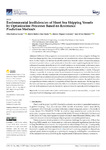Environmental inefficiencies of short sea shipping vessels by optimization processes based on resistance prediction methods

Use este enlace para citar
http://hdl.handle.net/2183/32198
Excepto si se señala otra cosa, la licencia del ítem se describe como Attribution 4.0 International (CC BY 4.0)
Colecciones
- Investigación (EPEF) [590]
Metadatos
Mostrar el registro completo del ítemTítulo
Environmental inefficiencies of short sea shipping vessels by optimization processes based on resistance prediction methodsFecha
2022-10-09Cita bibliográfica
Matínez-López, A.; Díaz Ojeda, H.R.; Míguez González, M.; Marrero, Á. Environmental Inefficiencies of Short Sea Shipping Vessels by Optimization Processes Based on Resistance Prediction Methods. J. Mar. Sci. Eng. 2022, 10, 1457. https://doi.org/10.3390/jmse10101457
Resumen
[Abstract]: Fulfilment of the progressive environmental normative involves a singular challenge for Short Sea Shipping (SSS), since it must maintain its competitiveness versus other transport alternatives. For this reason, over the last decade SSS vessels have been the subject of numerous analyses, in terms of operative research, and optimizations, from the marine engineering standpoint. Despite widespread awareness about the impact of a vessel’s resistance on environmental performance, many of the previous analyses were based on resistance prediction methods with low accuracy levels. This fact necessarily involves deviations regarding the expected sustainability of vessels. This paper attempts to quantify (in monetary terms) the environmental consequences due to this low level of accuracy. To meet this aim, it analyzes the environmental performance of an SSS feeder vessel, which was obtained from an optimization process based on standard resistance prediction techniques, when its propulsion power requirements for sailing at optimized speed were assessed through the Reynolds Averaged Navier–Stokes method in Computational Fluid Dynamic simulations. The findings show that standard resistance prediction methods without consideration of hull shape must be avoided, not only in the optimization process, but also for operative research, especially in free sailing analysis.
Palabras clave
Environmental costs model
Vessel emissions
Maritime sustainability
Computer fluid dynamics
Short Sea Shipping
Vessel optimization
Vessel emissions
Maritime sustainability
Computer fluid dynamics
Short Sea Shipping
Vessel optimization
Versión del editor
Derechos
Attribution 4.0 International (CC BY 4.0)
ISSN
2077-1312






